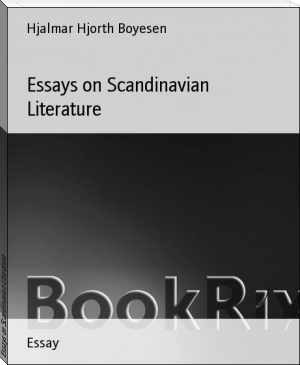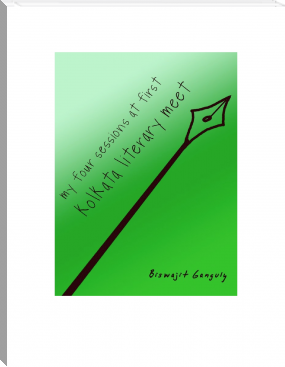Essays on Scandinavian Literature - Hjalmar Hjorth Boyesen (best books to read non fiction txt) 📗

- Author: Hjalmar Hjorth Boyesen
Book online «Essays on Scandinavian Literature - Hjalmar Hjorth Boyesen (best books to read non fiction txt) 📗». Author Hjalmar Hjorth Boyesen
inconceivable violence, until it suddenly broke and burst into
pieces. Darkness--darkness--darkness and night spread over the
whole world wherever I turned. I was bewildered and faint, and I
who had always hated weakness in men--I wept; I shed hot, burning
tears. All was over."[41]
[41] Brandes: Esaias Tegnér, pp. 231-223.
Contrary to the expectation of his friends he recovered rapidly, and was able to return home in May, 1841. He promptly resumed his episcopal functions, and even wrote a beautiful rural idyl in hexameters called "The Crowned Bride" (_Kronbruden_), which he dedicated to Franzén. He was well aware, however, that his powers were on the wane, and in 1845 he was persuaded to apply for a year's relief from his official duties. The last months of his life he spent mostly lying upon a sofa in his library, surrounded by great piles of books containing a most miscellaneous assortment of classics, from Homer to Goethe, intersprinkled with controversial pamphlets and recent novels. He was gentle and affectionate in his demeanor; and his beautiful face lighted up with a smile whenever any of his children or grandchildren approached him. Once or twice a day he drove out in his carriage, and he was even able to visit his eldest son, who was a clergyman in Scania, and to receive the sacrament for the last time from his hand. Shortly after his return he was stricken with paralysis, and died November 2, 1846, in the sixty-fourth year of his age. His mind was unclouded and his voice was clear. When the autumnal sun suddenly burst through the windows and shone upon the dying poet, he murmured: "I will lift up mine hands unto the house and the mountain of God."
These were his last words. He was carried to the grave at night by the light of lanterns, followed by a long procession of the clergy, citizens, and the school-boys of his diocese. Peasants, from whose ranks he had sprung and to whom he was always a good friend, bore his coffin.
The academic tendency which "idealizes" life and shuns earth-scented facts, had, through the decisive influence of Tegnér, been victorious in Swedish literature. I am aware that some will regard this as a questionable statement; for the academicism of Tegnér is not the stately, bloodless, Gallic classicism of the Gustavian age, of which Leopold was the last representative. It is much closer to the classicism of Goethe in "Iphigenia" and "Hermann and Dorothea," and of Schiller in "Wallenstein" and "Wilhelm Tell." Tegnér's poetic creed was exactly that of Schiller, who saw no impropriety in making the peasant lad, Arnold Melchthal, when he hears that his father has been blinded, deliver an enraptured apostrophe to the light:
"O eine edle Himmelsgabe ist
Das Licht des Auges," etc.
The rhetorical note is predominant in both. Their thoughts have to be arrayed in the flowing toga before they are held to be presentable. This is the academic tendency in Sweden as in France, even though the degree of euphemistic magniloquence may differ with the age and latitude. The Swedes have been called the Frenchmen of the North, and there is no doubt that delight in this toga-clad rhetoric is inherent in both. It was because Tegnér, in appealing to this delight, was so deeply representative that he extinguished the old school and became the national poet of Sweden.
* * * * *
Publication Date: 09-13-2010
All Rights Reserved





Comments (0)